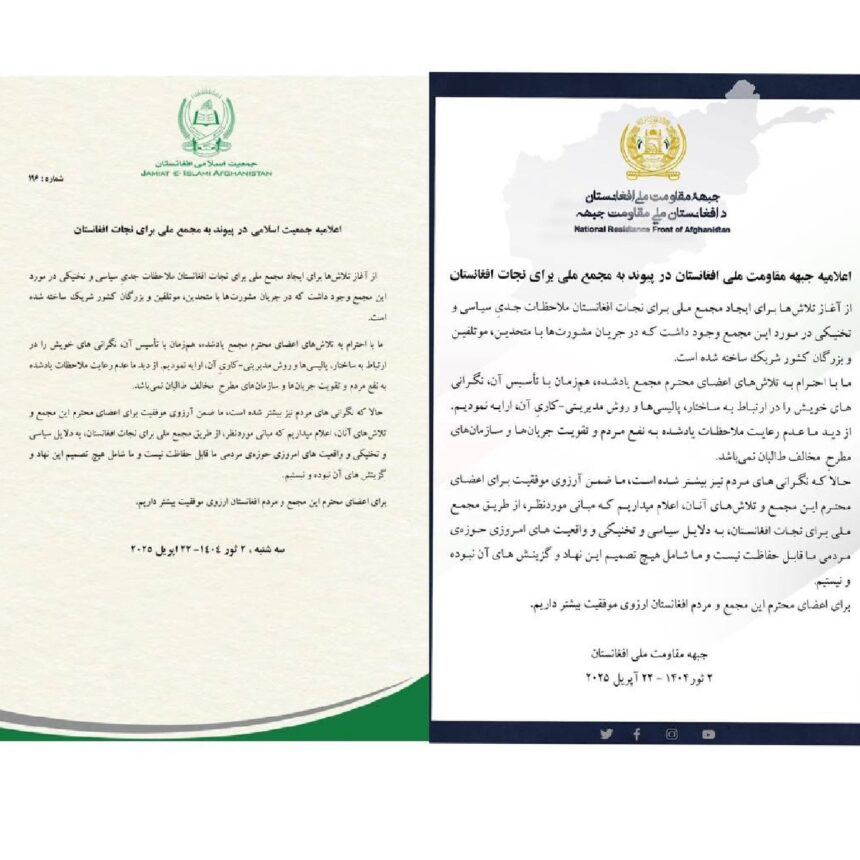RASC News Agency: In a significant political rupture that underscores the growing fragmentation among anti-Taliban forces in exile, three of Afghanistan’s most influential political entities have announced their formal withdrawal from the so-called National Assembly for the Salvation of Afghanistan. The groups namely the National Resistance Front (NRF) led by Ahmad Massoud, Jamiat-e Islami under the leadership of Salahuddin Rabbani, and the Freedom Front headed by former Deputy Minister of Defense Yasin Zia cited fundamental and irreconcilable differences over the Assembly’s organizational structure, policy direction, and governance practices as the impetus behind their decision.
In a strongly worded statement, Jamiat-e Islami declared that it had harbored serious apprehensions about the Assembly’s design and operational philosophy from the very beginning. According to the party, these concerns ranging from procedural shortcomings to deeper ideological misalignments were repeatedly shared with other senior political leaders and national dignitaries. However, the Assembly’s leadership consistently failed to engage with or meaningfully address these strategic objections. As a result, Jamiat stated that its withdrawal is not merely a political maneuver, but a principled stance taken in the national interest and aimed at reinvigorating a more coherent and effective opposition to the Taliban regime.
The statement emphasized that Jamiat-e Islami will henceforth refrain from participating in any decisions, consultations, or appointments facilitated by the Assembly, noting that continued involvement would be counterproductive to the broader objective of national liberation and democratic revival. Similarly, the National Resistance Front, widely regarded as a symbol of armed and political resistance against Taliban rule, issued a parallel declaration expressing dissatisfaction with the Assembly’s internal dynamics. The NRF criticized the Assembly’s leadership for failing to uphold foundational values and for demonstrating an inability to establish a cohesive and results-oriented platform. The Front emphasized that the existing structure of the Assembly lacks both the legitimacy and the institutional maturity necessary to coordinate national resistance. Consequently, the NRF announced its complete disengagement from all activities, deliberations, and frameworks associated with the Assembly, while reaffirming its commitment to independently pursuing a path toward a pluralistic and sovereign Afghanistan.
In a separate development, the Freedom Front of Afghanistan, led by General Yasin Zia, issued a clarification dismissing widespread speculation about its affiliation with the Assembly. The Front categorically stated that it has never been part of the coalition and firmly denied any intention to join. However, it reiterated its willingness to engage with other anti-Taliban movements, provided such collaborations are grounded in mutual respect, strategic autonomy, and freedom from factional or partisan entanglements. This collective distancing from the National Assembly signals a deepening crisis of confidence in coalition-based resistance initiatives and highlights the challenges of building a united front against the Taliban. Analysts suggest that the inability to forge consensus among key opposition factions could further hinder efforts to present a credible alternative to Taliban rule on the international stage.
Nonetheless, each of these groups has reaffirmed their unwavering commitment to the Afghanistani people’s struggle for freedom, dignity, and democratic governance, while calling for a renewed approach to resistance one that transcends symbolic alliances and prioritizes structural integrity, strategic clarity, and national unity.






